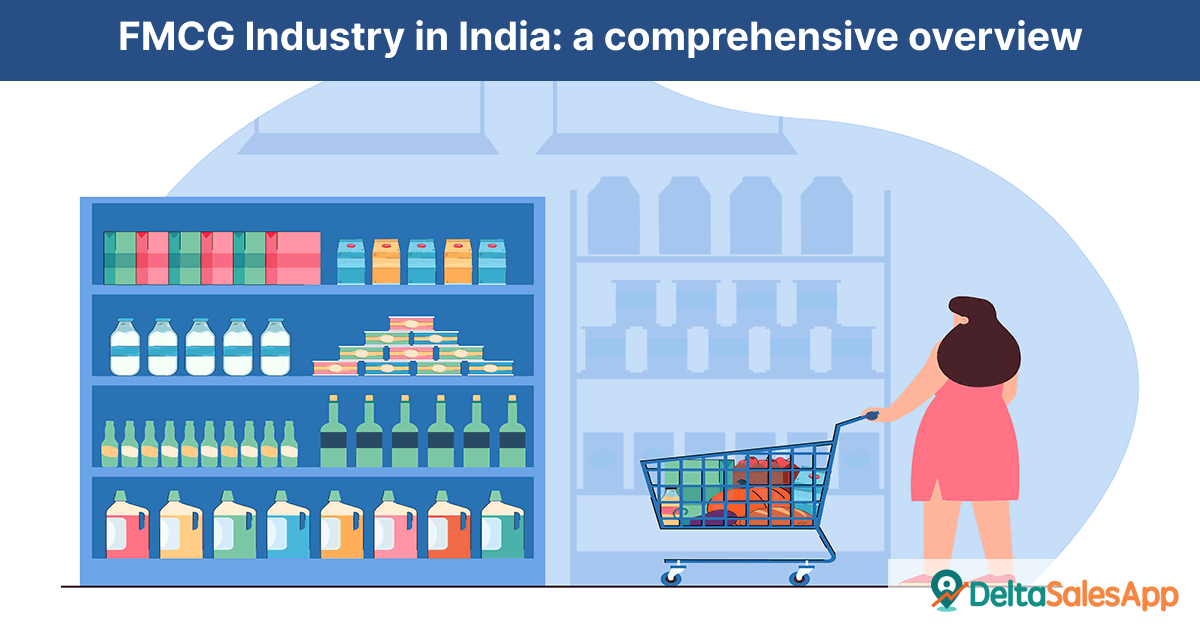FMCG industry in India: a comprehensive overview

The Indian FMCG sector is the fourth largest sector in the economy, with a total market size of over Rs 3,00,000 crore. The sector includes key segments like food and beverages, personal care, and home care. The sector has a strong rural penetration, with around 60% of the products consumed in rural India. FMCG companies in India have been playing an important role in the growth and development of the economy. The FMCG sector is one of the fastest-growing sectors in India. The sector has registered a CAGR of around 11% over the last five years. The sector is expected to grow at a CAGR of around 13% over the next five years. The sector's growth is driven by rising income levels, changing lifestyles, and increasing penetration of the organised retail sector.
The FMCG sector is highly competitive, with a large number of players. India's top 10 FMCG companies account for around 35% of the total market. The sector is dominated by multinational companies. The top 10 FMCG companies in India are ITC Limited, Hindustan Unilever Limited, Nestle India Limited, PepsiCo India Holdings Limited, Dabur India Limited, Britannia Industries Limited, GlaxoSmithKline Consumer Healthcare Limited, Godrej Consumer Products Limited, Procter & Gamble Hygiene and Health Care Limited, and Emami Limited. The FMCG sector is expected to benefit from the government's initiatives like Make in India, Digital India, and Swachh Bharat Abhiyan. The sector is also expected to benefit from favourable demographic factors like a large population, a young population, and rising income levels.
What is the FMCG industry?
The Fast-Moving Consumer Goods (FMCG) industry is a sector that deals with the production, distribution, and marketing of consumer goods that are sold quickly and at a relatively low cost. These goods are typically used daily and have a short shelf life. Examples of FMCG products include food and beverages, personal care items, household cleaning products, and toiletries. The FMCG industry is known for its high volume, low margin business model and is a key driver of economic growth in many countries.
In India, the FMCG industry is one of the largest and fastest-growing sectors of the economy. With a population of over 1.3 billion people, India is a huge market for FMCG products, and the industry is expected to grow rapidly in the coming years. The sector is dominated by a few large players, including Hindustan Unilever, Nestle India, and Procter & Gamble, but many smaller companies are making a name for themselves in the market. The FMCG industry in India is highly competitive, with companies constantly innovating and introducing new products to meet consumers' changing needs and preferences. Despite the challenges, the FMCG industry in India is a vital part of the economy, providing employment opportunities and contributing to the country's overall growth and development.
Current scenario:
The fast-moving consumer goods (FMCG) sector is important to the Indian economy. The sector is expected to grow at a CAGR of 20.6% to US$ 74 billion by 2025. The sector is driven by strong growth in rural and urban consumption and government initiatives, such as the Make in India campaign and the Swachh Bharat Abhiyan. The FMCG sector is highly competitive, with many domestic and international players. India's top 10 FMCG companies are Hindustan Unilever, ITC, Nestle, Dabur, Britannia, Godrej Consumer Products, Emami, Colgate-Palmolive, Marico, and Procter & Gamble. These companies have a strong presence in rural and urban markets and have a wide range of products in their portfolios.
- Hindustan Unilever is the largest FMCG company in India, with a turnover of Rs. 36,153 crores (US$ 5.3 billion) in FY 2016-17. The company has a strong presence in the soap, detergent, and personal care segments.
- ITC is India's second largest FMCG company, with a turnover of Rs. 27,360 crores (US$ 4 billion) in FY 2016-17. The company has a strong presence in the cigarettes, packaged food, and personal care segments.
- Nestle is India's third largest FMCG company, with a turnover of Rs. 9,490 crores (US$ 1.4 billion) in FY 2016-17. The company has a strong presence in the packaged food and beverages segments.
- Dabur is India's fourth largest FMCG company, with a turnover of Rs. 8,041 crores (US$ 1.2 billion) in FY 2016-17. The company has a strong presence in the Ayurvedic and natural products segments.
- Britannia is India's fifth largest FMCG company, with a turnover of Rs. 7,163 crores (US$ 1 billion) in FY 2016-17. The company has a strong presence in a different range of biscuits, cakes, bread, and dairy products.
Challenges:
The Indian Fast Moving Consumer Goods (FMCG) sector is one of the largest in the world, with a turnover of US$ 47.5 billion. The sector is expected to grow at a CAGR of 20.6% to US$ 103.7 billion by 2025. The FMCG sector in India is the fourth largest sector, with a market size of US$ 13.1 billion.
However, the sector is facing some challenges which are hindering its growth. Some of the major challenges faced by the FMCG sector in India are as follows:
-
Slowdown in Rural Demand:
The rural economy is a key growth driver for the FMCG sector in India. However, the slowdown in rural demand has hit the sector hard. Various factors, such as drought, floods, and demonetisation, have hit the rural economy. This has led to a slowdown in rural demand, which has affected the growth of the FMCG sector.
-
Slowdown in Urban Demand:
The urban economy is also a key growth driver for the FMCG sector. However, the slowdown in urban demand has hit the sector hard. Various factors, such as the slowdown in the real estate sector, job losses, and the overall economic slowdown, have hit the urban economy. This has led to a slowdown in urban demand, which has affected the growth of the FMCG sector.
-
Increasing Competition:
The FMCG sector in India is highly competitive. Many players are in the market, which has led to intense competition. The competition is further intensified by the entry of new players in the market. This is leading to pressure on the margins of the companies.
-
Changing Consumer Preferences:
Consumer preferences are changing rapidly. Consumers are now more conscious about their health and fitness. They are also more aware of the quality of the products. This leads to a change in consumer preferences, a challenge for FMCG companies.
-
Increasing Input Costs:
The input costs, such as raw materials and packaging, are rising.
Strategies for growth and success in the FMCG industry:
To succeed in the FMCG industry in India, companies need to be agile and adaptable to changing consumer preferences and market conditions. One key strategy is to invest in research and development to create innovative products that meet the evolving needs of consumers. Another important approach is to build strong distribution networks and supply chains to ensure products are available to consumers promptly and efficiently. Additionally, companies can leverage digital technologies to improve marketing and sales efforts and gain insights into consumer behaviour and preferences. By adopting these strategies, FMCG companies in India can position themselves for growth and success in a challenging and competitive market.
In addition to investing in research and development and building strong distribution networks, FMCG companies in India can benefit from collaborating with local partners and suppliers. This can help companies better understand local market conditions and consumer preferences and can also help to reduce costs and improve efficiency. Another important strategy is to focus on sustainability and social responsibility, as consumers in India are increasingly concerned about the environmental impact of products and companies' ethical practices. By adopting these strategies, FMCG companies in India can differentiate themselves from competitors and build strong relationships with consumers, leading to long-term growth and success in the industry.
Also, read our blog article on Why FMCG companies need a field sales tracking app?









